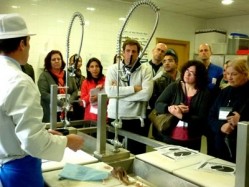Top fish swaps for sustainable menus

Sustainable Fish City: Top Ten Swaps sets out 10 of the most ‘at risk’ species of fish commonly served in restaurants, and proposes alternative species that these can be swapped for.
The guidance recently presented to chefs taking part in a sustainable seafood training event organised by Ethical Eats, a network of restaurants and caterers focused on sustainability. Both Ethical Eats and Sustainable Fish City are projects of Sustain: The Alliance for Better Food and Farming.
The top ten fish swaps are:
Tuna
Why swap? There are lots of different species of tuna, a few of which are critically endangered and some of which are caught in ways that damage other marine life.
Top swaps: Try Marine Stewardship Council (MSC) certified albacore tuna – hand-caught in the Pacific Ocean. Albacore has very light, firm and delicately flavoured meat, and is available canned and in jars. Fresh Cornish line-caught albacore is also available. Most canned tuna is skipjack, the most resilient species of tuna, with all stocks currently healthy – choose pole and line, handline or troll caught.
Salmon
Why swap? Salmon is sometimes farmed very intensively, leading to serious environmental problems.
Top swaps: Why not try MSC certified Alaskan wild salmon. It's much leaner than farmed salmon, so be careful not to overcook it. Alternatively, look out for certified organic farmed salmon or Freedom Food farmed salmon. Or, for grilling or pan-frying, try mackerel (which is a healthy as well as a tasty choice,containing nearly twice as many healthy omega 3 fatty acids as salmon).
Haddock
Why swap? Our love of this chip-shop favourite has led some haddock stocks to be over-fished.And haddock often swim with cod (see below), meaning that haddock fisheries may catch both fish.
Top swaps: Look out for MSC certified haddock from Scotland or Norway, or try a different firm, white fish such as bib (also known as pouting), or coley (often sold as saithe), which has an undeserved reputation as something you feed to the cat but, when spanking fresh, is delicious.
Cod
Why swap? Many stocks of Atlantic cod are overfished.
Top swaps: Give cod a break and try a different white, flaky fish such as the delicate pollack (line-caught from Cornwall is a good choice), or the similarly named MSC certified Alaskan pollock. Bib/pouting or coley (see above) are also great alternatives. If only cod will do, go for MSC certified cod from the Arctic, Atlantic & Pacific oceans.
Prawns
Why swap? King or tiger prawns are usually farmed in the tropics, often very intensively and in ways which can seriously damage local communities and the environment.
Top swaps: Choose organic tiger prawns, or for a more local option, go for Scottish langoustines (also known as Dublin Bay prawns or scampi). Or look out for the smaller MSC-certified cold-water prawns from Canada. Like prawns, crab is as good with strong flavours like chilli as it is plain with lemon and mayonnaise.
Plaice
Why swap? Left to their own devices, plaice can live for 50 years or more. They grow and reproduce very slowly, making them vulnerable to overfishing. Some beam trawl fisheries catch vast numbers of young plaice as ‘bycatch’, and throw them back into the sea, dead.
Top swaps: More sustainable flatfish choices include flounder, dab or lemon sole (ask for fish caught by otter trawl or seine net). Or go for MSC certified plaice, or (for posh) MSC certified Dover sole.
Swordfish
Why swap? Big, slow-growing 'game' fish like swordfish are particularly vulnerable to over-fishing.
Top swaps: Nothing similar fits the sustainability bill, but jig-caught squid stands up to strong flavours and is delicious grilled or on the barbeque – and ditto for mackerel.
Seabass
Why swap? Sea bass is commonly farmed in the Mediterranean, and is a carnivorous fish, raising the problem of fish-feed. Wild sea bass are often caught in pelagic trawls that can kill other sea life such as dolphins.
Top swaps: Look for line-caught sea bass or organically farmed sea bass, or try line-caught black bream, porgy or seabream.
Skate
Why swap? Sadly, the once “common” skate is now critically endangered, and several other species of skates and rays are overfished.
Top swaps: Nothing really compares to the soft, fibrous texture of skates and rays, but the smaller starry, spotted and cuckoo rays are generally considered a more sustainable choice. Bizarrely, circles of skate wing are sometimes sold as fake scallops, so a luxurious alternative could be diver-caught scallops.
Halibut
Why swap? Halibut is another slow-growing, long-lived species that has been overfished to the point of being endangered.
Top swaps: As an alternative, look for MSC certified Pacific halibut – or for something different but similarly meaty and very tasty, try red, grey or tub gurnard.



















